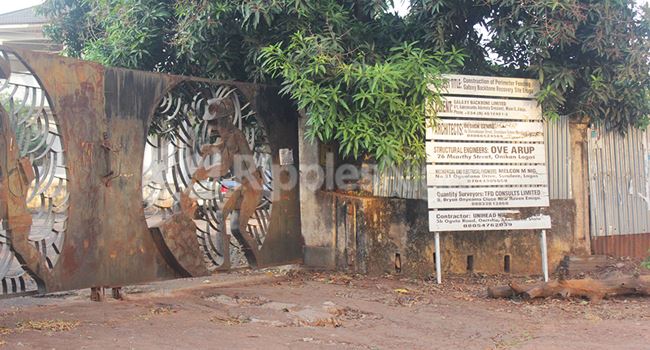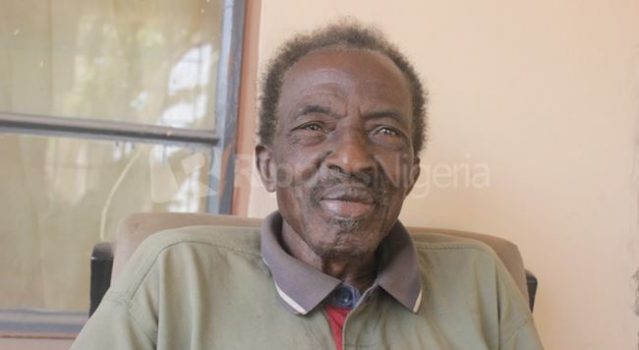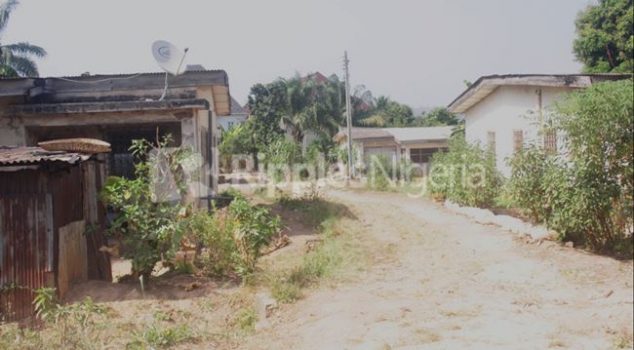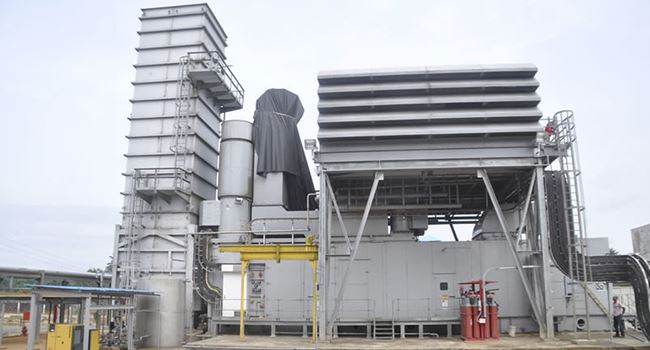ICYMI: SPECIAL REPORT… Privatization and failed promises —Inside the abandoned Enugu coal industry
A once booming venture, Nigeria’s coal industry has been stripped of life and laid bare with its potential for wealth creation greatly diminished. A cursory observation reveals thousands of job losses caused by a failed privatization scheme that has left everything in tatters and made nonsense of the nation’s mouthed diversification plans. Investigative reporter, PATRICK EGWU, visited the Enugu coal mines, which is now a shadow of its old self.
On a sweltering Tuesday afternoon, Ray Chime sits at the balcony of his home located at Colliery Avenue in Enugu. Colliery Avenue is the residential quarters for coal miners working at coal fields in the state.
Chime was the former Colliery manager of the Nigerian Coal Corporation [NCC]. When he started working with the NCC in January 1972, it was a booming industry which served as a major source of foreign exchange for the country with coal being exported to the UK, South Africa, Egypt and Ghana.
“The coal industry is now moribund and all efforts to revive it have failed,” Chime tells Ripples Nigeria. “There was politics in it,” he says. “I am sure that if the coal corporations were situated in the north, the federal government won’t allow it to die like this.
The government is not interested in trying to get it resuscitated and the machines need to be constantly revived.”
For Chime, the once booming industry has become a shadow of itself following the privatization policy of the federal government in 1999.
With the privatization taking full force, workers were retrenched, the NCC properties were sold off and a deal that killed the fortunes of the industry was sealed.
The good-old beginnings

Aerial view of the deserted Onyeama mine field in Enugu. The mines tunnels are located few kilometres away. Photo by Patrick Egwu
Before the discovery of crude oil, coal was once treasured as a jewel, powering the national and regional economies in the country. Presently, experts are worried that an all-important money-earner like coal could be so abandoned. This is considering that coal is still a money-spinner and keeps industries running in other economies of the world. Coal-powered stations reportedly generate about 40 percent of the world’s electricity.
Much of the materials used in making steel, coke, is derived from coal. The beauty industry also finds coal extremely useful in producing such items as shampoo and dandruff-fighting creams or powders. Fertilisers are by-products as well. Even concrete is derived from coal.
Coal was discovered in Enugu in 1908 by a team of British geological explorers led by Albert Kitson, but actual mining did not start until 1916, a year after the then British colonial government and several Udi warrant chiefs led by Onyeama of Eke signed an agreement for its exploitation.
However, with the discovery of oil in 1956 in Oloibiri, Bayelsa State in commercial quantity, the coal industry started dying off gradually. According to the Enugu State Tourism Board [ESTB], up until this point, the Nigeria Railway Corporation [NRC] was the largest consumer of coal in the country, but with the discovery of oil, the NRC began to replace its coal burning trains with diesel-powered engines.
Another negative impact on the industry was when the then Electricity Corporation of Nigeria began converting its power generation equipment from coal to diesel and gas.
Further chronicling the challenges of the industry, the Board notes that “the Nigerian Civil War negatively impacted coal production; many mines were abandoned during the war. Following the war, production never completely recovered and coal production levels were erratic. Attempts at mechanizing production ended badly, as both the implementation and maintenance of imported mining equipment proved troublesome, and affected production. After the civil war, the Nigerian coal industry has not been able to return to its peak production of the 1950s.”
Nevertheless, Nigeria still holds large coal reserves, estimated at about 2 billion metric tonnes which is said to be low in sulphur content and in high demand in international markets. Experts are therefore worried over the poor state of the industry which they say if properly harnessed, will not only restore the nation’s long years of epileptic power supply, but also contribute to the nation’s forex earnings and employment generation.
The Kopex and Bul-Nig take-over agreements

Ohagwu, the former Colliery manager of the Nigerian Coal Corporation (NCC). Photo by Patrick Egwu
In an attempt to revamp the industry, the Nigerian government signed an agreement with Kopex, a Polish company based in Warsaw to take over mining and boost productions with the NCC playing supervisory roles. Efforts to retrieve the documents of the agreement was not successful. However, what many Nigerians hoped would be the best deal to revive the industry, became unsuccessful after a few years.
“They came around 1977 but they couldn’t do much because their activities weren’t reliable,” Hyacinth Ohagwu, a former engineering manager at the industry said. “For instance, they brought in obsolete equipment when new ones were paid for.”
“Kopex left because their system of mining and ours was different, hence, the privatization didn’t work for them,” Ohagwu said.
After Kopex left and couldn’t continue coal exploration, some foreign companies were consulted to run and manage the industry as a way of making it work optimally again. The first country that won the bid to revive the industry was a company from Bulgaria. The agreement was later known as “Bul-Nig” to reflect the name of the two countries. According to the agreement, when produced, the company was expected to take 40 percent of the gains while the NCC takes 60 percent.
“They bided and the agreement then was that if the coal is produced in Nigeria, it would be exported to Poland, Ghana, Egypt and South Africa among others. They competed with other companies and won the bidding,” Chime said of the agreements. “They even sent some of us abroad to learn their mining practices.”
In 2002, in what appeared to be the last efforts of the President Olusegun Obasanjo’s administration to revive the industry, Nigeria and South Africa signed an agreement for the development of the coal industry in Nigeria by exploring specifically, the Onyeama, Okpara and Owukpa coal mines. However, mining development didn’t commence as was promised and little is known of the outcome of the deal today.
Privatization that finally terminated the industry
What looked like a ray of hope came for the coal industry in 1999 when former President Obasanjo initiated plans to privatize it, alongside other national assets. With the development, the NCC lost its monopoly over the Nigerian coal industry, as the government allowed private companies to begin operating coal fields in joint ventures with the NCC, with an eventual goal of completely selling off the NCC’s assets to private investors. The government planned to sell 40 percent to private investors and 20 percent to the Nigerian public while retaining 40 percent.
According to ESTB, in 2003, the federal government announced plans to create a technical advisory committee that would be tasked with reviving the industry. However, by 2004, the technical committee had not issued their report and the NCC found itself almost bankrupt. To raise funds, it began selling off some of its assets to pay off mounting debts, including salaries owed its staff.
The Enugu state government under former governor Chimaroke Nnamani, had protested the planned privatization and demanded for consultation with the federal government on any planned sale.
Having lost the mining fields to private investors, the Enugu State Government under former governor Sullivan Chime succeeded in taking over two properties of the NCC purchased from the Bureau of Public Enterprise [BPE] under the federal government’s privatization of its landed properties. The two properties are the headquarters of the Corporation located along Okpara Avenue and the Colliery hospital also in Enugu.
At the handover ceremony, the then Director-General of BPE, Benjamin Ezra Dikki had stated that the privatization of the Corporation which started in 2007 was aimed at handing over the coal blocks to credible investors that would invest money and expertise to mine the coal blocks to create jobs and boost the economy of the state and Nigeria at large. It is yet to be seen how those goals have been achieved, as companies with mining licenses are yet to begin coal exploration.
Unfortunately, the headquarters of the NCC in the state has also been sold off to a private investor by the state government. When this reporter visited the premises, the signage of a company contracted to construct a perimeter fencing around the premises was seen at the entrance gate. An attempt to enter the premises was blocked by a security man at the gate. But the miners want it back.

Former NCC headquarters now sold to a supposed private investor
“The place has been sold by government and non-government groups,” Ohagwu, said. “We have repeatedly made our feelings known that we want that structure back even if every other thing is sold. Because it is a very costly monument for the nation and not only the state. The industry played a very important role in Nigeria’s independence and if not anything, can serve as a museum for the young generation.”
“People thought the privatization would revive the industry,” Ohagwu who voluntarily left the industry before the privatization said. “They are yet to complete the payoff for workers.”
Failed promises
Over the years, the people of Enugu state had hoped for the revival of the once-booming coal mining activities in the state which they believe would provide electricity to the region, power industries and provide direct employment. However, successive administrations have come and gone without as much as a passing glance at the mine.
Hope appeared to have been reignited last year when the Minister of State, Mines and Steel Development, Uchechukwu Ogah visited the state and revealed the federal government’s plans to revamp the moribund industry.
Ogah said his team was on a fact-finding mission with regards to “what is already on ground, what the Federal Government has done and what we can do to revive the coal mines in Enugu State so that they can help grow the economy and generate jobs.”
Earlier in 2015, President Muhammadu Buhari had during his election campaign, pledged to revive the coal industry. Buhari had promised that the abundant coal deposits in Enugu would be harnessed to grow the Nigerian economy, and also generate employment opportunities for youths in the South East and other parts of the country. Specifically, he said that coal deposits would be used to revamp the Oji River Power Station which generated electricity for the defunct Eastern Region and has the capacity of generating the nation’s 30 percent energy needs.
But nearly five years after, nothing has been heard of that promise.
In 2016, a group under the aegis of Buhari Support Organization [BSO] once again, drew attention to the condition of the mine by including it in their list of demands for the president to address alongside projects planned for other geopolitical zones with the $30 billion loan being sought from multinational institutions.
Ex-workers’ continued protests
Former workers of the Corporation are wondering the type of privatization carried out in Nigeria’s premier solid mineral industry that has completely deflated the industry. As far as the ex-staff are concerned, what took place was outright devastation of equipment and properties of the industry, with no intention to revitalize the Corporation as was the original philosophy of the federal government’s privatization policy.
According to them, it is pathetic that the industry has gone under with no hopes in sight of ever mining coal. This is even as they claim to be owed wages and entitlements with all the properties of the Corporation sold to individuals.
Aggrieved workers had already petitioned President Buhari over their plight. The issue they raised included; non-settlement of all arrears owed the disengaged staff of the NCC amounting to about N315 million; destruction of coal mining property by the BPE through a property consultancy firm, corruption through purported monetization of houses of the NCC, allegedly committed by the consultancy firm, among other allegations.
In one of the petitions, the workers claimed that the “BPE and their agents sold off heavy plants and machinery of the NCC at very ridiculous prices and declared peanuts to the BPE and even the lands too. This is a clear case of corruption.
“Example of such sale made is the gigantic and highly sophisticated coal washery plant housed in an entire seven-storey building built by Kopex contractors, Poland, together with the vast land housing the edifice worth over a billion naira was sold at N160 million.
“Other examples are two capacity coal briquette plants at Enugu and Ankpa, Kogi states which were sold in the same manner as plants and weigh bridges at Enugu, Okaba and Owukpa, among many others.”
They, therefore, urged the President to scrutinize all transactions made by the BPE, their agents and NCC officials, maintaining that due process was not followed.
They further prayed the President to “ask the BPE, NCC and their agents to make available a comprehensive list of all NCC office properties in the country, whether leased or not; whether sold or not as a lot of lease documents were manipulated while a good number of leases that expired were secretly and hurriedly re-negotiated, back dated and removed from government files.”

Chime, a former miner, witnessed the Iva Valley massacre of 1949 where more than 20 miners were killed. Photo by Patrick Egwu
Amidst the raging controversies, with some of the matters already in court, Dikki stated that it was not the business of the BPE to question what buyers of properties do with them as they have become the properties of the new owners.
On the issue of sold processing plants being used for other purposes other than for coal matters, Dikki said the plant was vandalized before the BPE sold it to the new owner, which he said was the reason he could not hold the new owner responsible.
He however, said all hopes were not lost for the revival of the industry through privatization, stating that there is an existing committee drawn from government agencies with the mandate to draw a road map for the immediate coal mining revival.
“We were supposed to go to the five coal blocks to make diligence recommendation but the rainy season disrupted it because you can’t go to the mines in rainy seasons but now that the rains are getting over, we will soon commence the assignment,” he said.
“The welfare of workers was very poor. No worker enjoyed his services as a coal worker. They were not well looked after like other workers in other establishment,” Ohagwu said. “So for now, it has not been settled anyway. And they are still owing many of us our welfare packages like for me I have not received anything since I left in 1994. So many workers were underpaid. Some were not paid at all.”

Inside the Kopex quarters. Photo by Patrick Egwu
On December 30, 2019, some Kopex properties where some of the miners presently live were put up for bidding and sale in the national dailies on January 14 and 17. For instance, a Kopex quarters with 16 bungalows in it at Iva Valley in Enugu where Ohagwu and his family and other miners live were put up for public bidding on January 16.
“This is not fair. They put up the advert when people must have travelled for the Christmas holidays,” Chime said.
Future expectations
The governor of Enugu state, Ifeanyi Ugwuanyi has on many occasions, expressed sadness over the inability of the state to tap from the economic benefits of coal and other solid mineral deposits in the state.
He urged the National Assembly to amend the Nigerian constitution towards transferring the prospecting and exploitation of solid minerals from the exclusive legislative list to the concurrent list.
This, he said, would enable the states participate in the issuance of mining licenses.
The governor also asked the federal government to compel companies with mining licenses in the state to commence operations, or have the licenses revoked.
He regretted that companies with mining permits had failed to commence operations, saying that the situation could have been avoided if the governors were involved in the issuance of licenses.
Stressing the importance of mining to the federal government’s economic diversification agenda, Ugwuanyi noted that Enugu state had not benefited from coal and other solid mineral deposits in the state.

He underscored the need for mining to commence immediately, saying “We have to say that this is even more important for Enugu State, a state that is richly endowed with solid mineral resources but which paradoxically, has gained so little from their existence, especially after the collapse and the eventual winding up of the NCC due to the nonchalant and uncooperative attitude of the owners of mining leases and licenses in the state.”
In 2018, during a trip to Poland for the COP24 – the United Nations 24th annual climate change conference, he had a discussion with the Polish government on how to partner and revive the coal industry in the state. Nearly 90,000 Poles are employed in coal mining, and for decades, they have enjoyed high wages and benefits from the industry. However, the outcome of that meeting is yet to be seen in real terms.
Geometric Power shares hope for revival

Geometric Power, an independent power generating and distribution company in the country says it is currently working on the development of 1000MW coal fired power plant [500MW in the first phase expandable to 1000MW in the second phase] in Nigeria.
According to the GENCO, the inspiration for this project is based on its founding philosophy of developing power projects which will result in immediate commercial advancement and development of the host community while making economic sense for the investors.
Giving further reasons for a coal powered plant, Geometric says “with a generation type mix of 70 percent gas and 30 percent hydro, Nigeria is unduly dependent on gas, including the Aba IPP, for power supply. With the underdevelopment of gas infrastructure for domestic use, gas supply is even more precarious. The country now has more installed generation capacity than can be adequately supported by available gas.
“Secondly, though the hydro is a renewable source of energy and in fact the cheapest source, it is seasonal and the country cannot be said to be hugely endowed with hydro potentials. A situation where it is constantly used as a peaking source whenever the gas plants are down, perennially places the country in short supply even when the gas stations are up during seasons of low water levels.
“Coal as fuel for the proposed power plant gives a triple edge advantage; it provides the needed diversification, cheaper overall electricity and its abundance locally effectively mitigates the fuel supply risk factor that has bedeviled gas as a source of fuel for power plants in the country.”
It added that this project is envisaged to supply power to the national grid and all classes of consumers within the country and also diversify fuel source for power development for both Geometric Power and Nigeria at large.
In the early years before its decline in the 1980, coal for instance, was used to power the Oji River Power Station in Enugu which generated power for the region and beyond. Industries in Enugu like Premier Cashew industry, AvopVegetable Oil, Sunrise Flour Mills, Niger Gas and Niger Steel were all powered by coal.
“The construction of a coal power plant provides multiple benefits to the nation especially the people of the state where the plant will be located. A key benefit is that it provides immediate employment opportunities [for both skilled and unskilled labour] as well as infrastructural development in the area. Given the integrated nature of the project, it is expected to attract an influx of allied businesses that support both the coal mining and power plant operations. Thus, the most significant benefit when the project is commissioned, will be a major economic transformation of the area,” it stated.
Despite promises expressed by Geometric Power in generating power using coal, residents in the state famously known as “Coal City” because of its large coal deposits, think the federal government is not sincere in fulfilling its promises of reviving the industry. Former workers are still living in solitude of working for an industry that never cared for their welfare.
Chime’s father who was a former miner, witnessed the Iva Valley massacre of 1949 where more than 20 miners were killed by the colonial police for demanding better welfare packages. In 2006, Chime retired from active service and is yet to be paid all his full benefits.
“It is all window dressing because the government was not serious with it else they wouldn’t have allowed it to collapse like that because the country was making lots of money from it,” Chime said of renewed interest of the government at reviving the industry. “We have seen this before and we are here to see what becomes of the industry”, he concluded.



